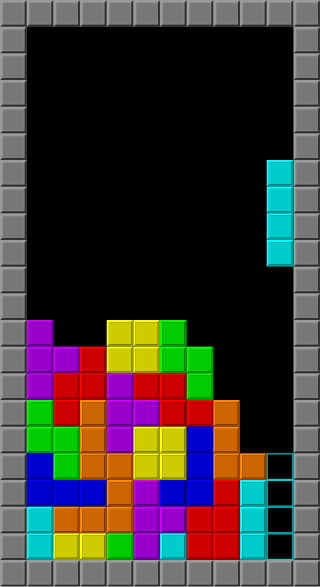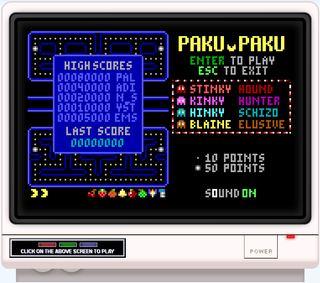Related Research Articles

A video game or computer game is an electronic game that involves interaction with a user interface or input device to generate visual feedback from a display device, most commonly shown in a video format on a television set, computer monitor, flat-panel display or touchscreen on handheld devices, or a virtual reality headset. Most modern video games are audiovisual, with audio complement delivered through speakers or headphones, and sometimes also with other types of sensory feedback. Some video games also allow microphone and webcam inputs for in-game chatting and livestreaming.
A computation is any type of arithmetic or non-arithmetic calculation that is well-defined. Common examples of computations are mathematical equations and computer algorithms.

A computer mouse is a hand-held pointing device that detects two-dimensional motion relative to a surface. This motion is typically translated into the motion of the pointer on a display, which allows a smooth control of the graphical user interface of a computer.

The Commodore 64, also known as the C64, is an 8-bit home computer introduced in January 1982 by Commodore International. It has been listed in the Guinness World Records as the highest-selling single computer model of all time, with independent estimates placing the number sold between 12.5 and 17 million units. Volume production started in early 1982, marketing in August for US$595. Preceded by the VIC-20 and Commodore PET, the C64 took its name from its 64 kilobytes(65,536 bytes) of RAM. With support for multicolor sprites and a custom chip for waveform generation, the C64 could create superior visuals and audio compared to systems without such custom hardware.

Tetris is a puzzle video game created in 1985 by Alexey Pajitnov, a Soviet software engineer. It has been published by several companies for multiple platforms, most prominently during a dispute over the appropriation of the rights in the late 1980s. After a significant period of publication by Nintendo, in 1996 the rights reverted to Pajitnov, who co-founded the Tetris Company with Henk Rogers to manage licensing.

The history of video games began in the 1950s and 1960s as computer scientists began designing simple games and simulations on minicomputers and mainframes. Spacewar! was developed by Massachusetts Institute of Technology (MIT) student hobbyists in 1962 as one of the first such games on a video display. The first consumer video game hardware was released in the early 1970s. The first home video game console was the Magnavox Odyssey, and the first arcade video games were Computer Space and Pong. After its home console conversions, numerous companies sprang up to capture Pong's success in both the arcade and the home by cloning the game, causing a series of boom and bust cycles due to oversaturation and lack of innovation.

A video game console is an electronic device that outputs a video signal or image to display a video game that can be played with a game controller. These may be home consoles, which are generally placed in a permanent location connected to a television or other display devices and controlled with a separate game controller, or handheld consoles, which include their own display unit and controller functions built into the unit and which can be played anywhere. Hybrid consoles combine elements of both home and handheld consoles.

Sin is a first-person shooter video game developed by Ritual Entertainment and published by Activision in 1998. It uses a modified version of the Quake II engine. Sin is set in the dystopian future of 2037, where John Blade, a commander in a security force named HardCorps in the megacity of Freeport, is tasked to rid the city of a recreational drug that may be tied to the rival biotechnology megacorporation, SinTek.
The Computer Olympiad is a multi-games event in which computer programs compete against each other. For many games, the Computer Olympiads are an opportunity to claim the "world's best computer player" title. First contested in 1989, the majority of the games are board games but other games such as bridge take place as well. In 2010, several puzzles were included in the competition.

A personal computer game, also known as computer game or abbreviated PC game, is an electronic game played on a personal computer (PC) and form of video game. They are defined by the open platform nature of PC systems.
In video games, artificial intelligence (AI) is used to generate responsive, adaptive or intelligent behaviors primarily in non-playable characters (NPCs) similar to human-like intelligence. Artificial intelligence has been an integral part of video games since their inception in the 1950s. AI in video games is a distinct subfield and differs from academic AI. It serves to improve the game-player experience rather than machine learning or decision making. During the golden age of arcade video games the idea of AI opponents was largely popularized in the form of graduated difficulty levels, distinct movement patterns, and in-game events dependent on the player's input. Modern games often implement existing techniques such as pathfinding and decision trees to guide the actions of NPCs. AI is often used in mechanisms which are not immediately visible to the user, such as data mining and procedural-content generation.
VideoGames & Computer Entertainment was an American magazine dedicated to covering video games on computers, home consoles and arcades. It was published by LFP, Inc. from the late 1980s until the mid-1990s. Offering game reviews, previews, game strategies and cheat codes as well as coverage of the general industry, VG&CE was also one of the first magazines to cover both home console and computer games. The magazine gave out annual awards in a variety of categories, divided between the best of home video games and computer video games. The magazine featured original artwork by Alan Hunter and other freelance artists.
PlayStation is a video gaming brand that consists of five home video game consoles, two handhelds, a media center, and a smartphone, as well as an online service and multiple magazines. The brand is produced by Sony Interactive Entertainment, a division of Sony.

A personal computer, often referred to as a PC, is a computer designed for individual use. It is typically used for tasks such as word processing, internet browsing, email, multimedia playback, and gaming. Personal computers are intended to be operated directly by an end user, rather than by a computer expert or technician. Unlike large, costly minicomputers and mainframes, time-sharing by many people at the same time is not used with personal computers. Primarily in the late 1970s and 1980s, the term home computer was also used. The advent of personal computers and the concurrent Digital Revolution have significantly affected the lives of people in all countries.
Mathematical programming with equilibrium constraints (MPEC) is the study of constrained optimization problems where the constraints include variational inequalities or complementarities. MPEC is related to the Stackelberg game.

In computing, an emulator is hardware or software that enables one computer system to behave like another computer system. An emulator typically enables the host system to run software or use peripheral devices designed for the guest system. Emulation refers to the ability of a computer program in an electronic device to emulate another program or device.
The history of video games spans a period of time between the invention of the first electronic games and today, covering many inventions and developments. Video gaming reached mainstream popularity in the 1970s and 1980s, when arcade video games, gaming consoles and home computer games were introduced to the general public. Since then, video gaming has become a popular form of entertainment and a part of modern culture in most parts of the world. The early history of video games, therefore, covers the period of time between the first interactive electronic game with an electronic display in 1947, the first true video games in the early 1950s, and the rise of early arcade video games in the 1970s. During this time there was a wide range of devices and inventions corresponding with large advances in computing technology, and the actual first video game is dependent on the definition of "video game" used.

Designing Virtual Worlds is a book about the practice of virtual world development by Richard Bartle. It has been noted as an authoritative source regarding the history of world-based online games. College courses have been taught using it.

Circle is a 2017 South Korean science fiction television series starring Yeo Jin-goo, Kim Kang-woo, Gong Seung-yeon, and Lee Gi-kwang. The series features two parallel plots set in the years 2017 and 2037, both centered on twin brothers' struggle with the discovery and development of an advanced alien technology that could either be a boon or bane for the entire human race.